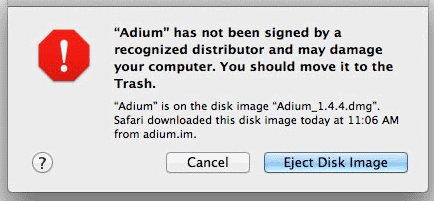Not to be outdone by Microsoft's announced intent to wall in Metro applications on all desktop platforms, Apple has launched a
bellwether in it's latest and greatest iteration of OSX.
A new 'feature' of OSX Mountain Lion Edition called
Gatekeeper "encourages" Macintosh application developers to register their software with Apple. Macintosh owners installing software that was not registered with Apple through a process Apple claims will be both "simple" and "inexpensive" were originally to be greeted with this rather frightening dialog box:

In the wake of complaints by developers, this original wording has since been toned down.
Gatekeeper does not (at this point) prevent a Mac owner from installing any software. But I think it's fairly obvious what Gatekeeper was created to accomplish. And also where it ultimately plans on going.
A Cory Doctorow piece was recently posted on
Boing Boing. In it he makes a case for what the
real problem is with DRM and where the more recent moves on the part of Apple and Microsoft to wall in the desktop will eventually take us if they succeed.
.
.
.
The law has always recognized that interoperability is good for competition, markets, and the public. From generic windshield-wiper blades and hubcaps to third-party hard-drives and keyboards and inkjet toner, and software like Pages and Keynote, the law recognizes that there is a legitimate reason to reverse-engineer a competitor's products and make new products that replace, expand and augment them.
Companies don't like this. It interferes with the "razor blade" business model of subsidizing one part of a product and charging high margins on some other part. It undermines efforts to corner markets and freeze out disruptive innovation. It lowers prices and forces you to spend more money on R&D to get the next product out because the profits have started to fall on the old products.
But these are not bugs, they're features. High prices on inkjet cartridges and proprietary cables and other consumables and accessories hold us back from realizing the full utility of our property. Allowing carriers to lock handsets to prevent the introduction of VoIP and tethering software to preserve high tariffs is good for telco investors, but bad for those of us who buy their products, and it removes the incentive to improve voice-call quality to compete with VoIP. Artificially prolonging the profitability of last year's invention means that this year's invention doesn't get made as quickly -- or at all.
Locking devices to only accept software that has been blessed by the vendor has been a profitable anticompetitive strategy. It's allowed the iOS App Store to command high commissions on sales, and to expand those commissions to cover transactions after the initial sale (if you spend money within an iOS App, Apple takes 30% of that transaction as well -- like a cash-register manufacturer demanding a slice of each transaction after you've bought the register). It allows the company to freeze out apps it doesn't like, even if customers want them. It undermines copyright by making it illegal for someone to create and sell their copyrighted software to willing buyers without the approval of the company that made the hardware the software will run on -- because the unblessed software won't run without breaking the DRM, and breaking DRM is illegal.
.
.
.
Well worth reading. Full article
here.

